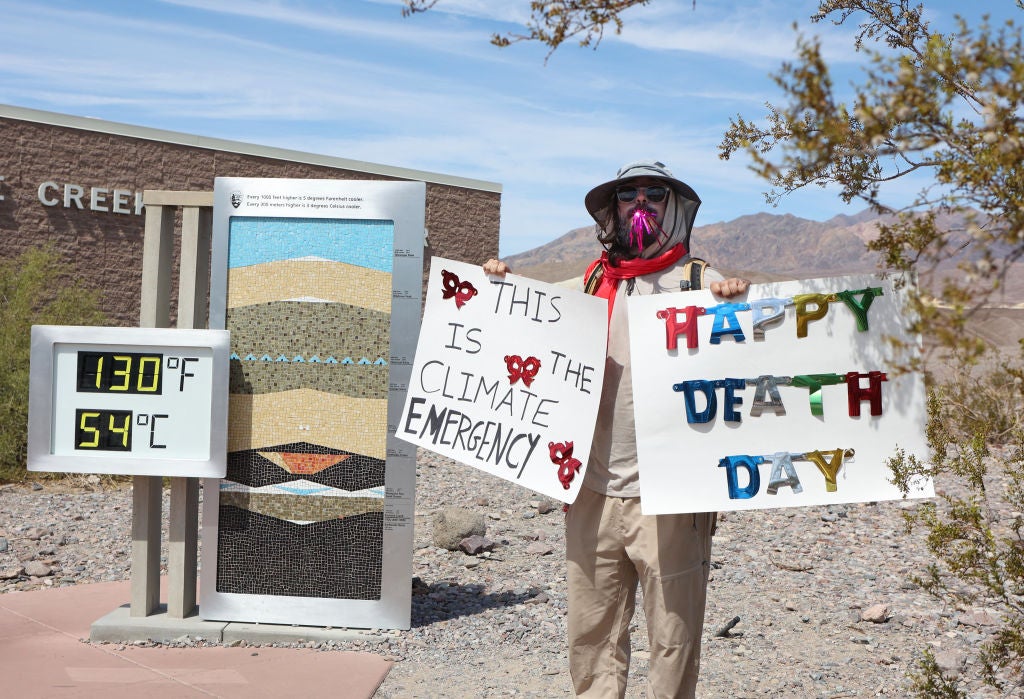Local officials ask US Congress to recognise extreme heat emergencies
Two organisations representing local officials wrote in support of Extreme Heat Emergency Act
Your support helps us to tell the story
From reproductive rights to climate change to Big Tech, The Independent is on the ground when the story is developing. Whether it's investigating the financials of Elon Musk's pro-Trump PAC or producing our latest documentary, 'The A Word', which shines a light on the American women fighting for reproductive rights, we know how important it is to parse out the facts from the messaging.
At such a critical moment in US history, we need reporters on the ground. Your donation allows us to keep sending journalists to speak to both sides of the story.
The Independent is trusted by Americans across the entire political spectrum. And unlike many other quality news outlets, we choose not to lock Americans out of our reporting and analysis with paywalls. We believe quality journalism should be available to everyone, paid for by those who can afford it.
Your support makes all the difference.Local officials have sent letters to Congress in support of a federal bill that would provide aid to states affected by unprecedented heatwaves.
The letters authored by the US Conference of Mayors and the National League of Cities that was obtained by NBC News showed support for the Extreme Heat Emergency Act, which was introduced last month.
The bill proposes to include extreme heat in the definition of the Federal Emergency Management Agency’s (Fema) list of major disasters, which would provide aid for states grappling with scorching temperatures.
This summer is the hottest recorded in history, with more than 170 million Americans under heat alerts in this recent week, according to the National Weather Service.
“By including extreme heat events in the definition of a major disaster... this legislation will empower local governments to establish cooling centers, support vulnerable populations, assist the homeless, and enhance healthcare services during extreme heat events,” an excerpt from National League of Cities CEO Clarence Anthony’s letter read.
Climate activists have pushed for the Joe Biden administration to declare a climate “emergency”, but the White House has yet to do so.
President Biden met on Thursday with the mayors of Phoenix, Arizona and San Antonio, Texas, two of the cities that have been affected the most by the heatwaves.
Phoenix has seen at least 26 days in a row of temperatures exceeding 110F. Maricopa County, where the city is located, has reported 18 heat-associated deaths between 11 April and 15 July.
Meanwhile, San Antonio saw 15 straight days of 100F temperatures. At least 13 deaths in Texas have been blamed on the extreme heat.
During the meeting on Thursday, Mr Biden called the rising temperatures “the number one weather-related killer” and announced a series of measures to protect workers, including a hazard alert notifying employers and employees about ways to stay safe from extreme heat.

“Even those places that are used to extreme heat have never seen it as hot as it is now for as long as it’s been,’’ Mr Biden said. “Even those who deny that we’re in the midst of a climate crisis can’t deny the impact of extreme heat is having on Americans.’’
A congressional aide told NBC that Fema has only received three requests for assistance in regard to extreme heat events throughout its 44-year history.
Every request has been turned down because the states requesting assistance “did not demonstrate that state and local capacity had been exceeded”. However, the aide noted that there is no official way to determine when a local’s government capacity has been reached.
“Our agency has a well-established process for assessing if there is a need for supplemental federal disaster assistance – where those needs exceed the state, tribal or local capacity,” a Fema spokesperson said in a statement to NBC.
“There is nothing specific that precludes a declaration for an extreme heat incident.”




Join our commenting forum
Join thought-provoking conversations, follow other Independent readers and see their replies
Comments